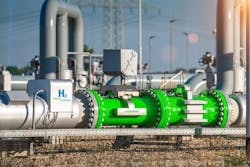German Aerospace Center opens hydrogen fuel cell development and testing facility
EMPFINGEN, Germany - As part of the BALIS project, the German Aerospace Center (Deutsches Zentrum für Luft- und Raumfahrt; DLR) is setting up a unique scientific test facility in Empfingen. DLR is using the facility to develop and test fuel cell propulsion systems for various modes of transport. The BALIS project is focusing on fuel cell assemblies with an output of around 1.5 megawatts, which while not yet available on the market, could be used to power ships or, eventually, aviation. Using hydrogen from renewable sources, known as green hydrogen, in fuel cells enables carbon-dioxide-free mobility, making it compatible with climate and environmental goals, the German Aerospace Center reports. Continue reading original article.
The Military & Aerospace Electronics take:
1 November 2024 - "The dialogue between research and industry that arises from the construction and use of large-scale facilities like BALIS is invaluable for both sides. This is how we not only jointly demonstrate that new technologies are functional, but also develop them to a size and economic viability that make them an interesting solution for industry," said Karsten Lemmer, DLR Executive Board Member for Innovation, Transfer and Research Infrastructure. "In aviation in particular, the step up from a stable propulsion system on the ground to qualification for use in aircraft is very complex and takes time. A facility like BALIS provides the basis and reliability needed to transform aviation."
"Hydrogen technologies are central to energy and transport research at DLR. Unlike other research centers, DLR covers the entire process chain with its interdisciplinary expertise in aeronautics, space, energy, transport, security and digitalization, from materials and processes for producing renewable hydrogen, to applications in mobile and stationary systems, to system analysis. It shows the contexts and conditions under which hydrogen technologies can create an economically viable, safe and sustainable energy and mobility system," added Meike Jipp, DLR Divisional Board Member for Energy and Transport.
Related: Dept. of Energy taps Piasecki Aircraft to study feasibility of hydrogen fuel cells for UAM
Related: Airbus shows off its hydrogen-powered fuel cell engine
Jamie Whitney, Senior Editor
Military + Aerospace Electronics
